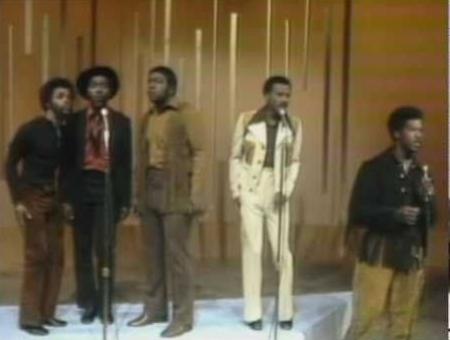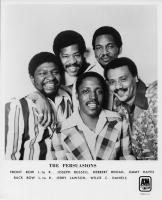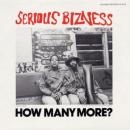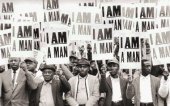(Spoken)
Buffalo Soldier, Buffalo Soldier [2]
Will you survive in this new land?
Buffalo Soldier, Buffalo, Buffalo, Buffalo Soldier
Tell me when will they call you...you a man
In the eighteen-hundreds
In Arizona and Mexico
Came a brand new soldier
The Indians called him "Buffalo"
From prison camps to slavery
Oh, the black man came to be
He was a hard-riding hero
Of the 10th Cavalry,
(hut-two-three)
You know many other soldiers
Lord, they wanted to desert
They were tired of the hatred, yes they were
They were so tired of the hurt
They were tired of the killing, oh no
And of the misery,oh Lord
But they had to keep on fightin'
So one day,we would be free
We wanna thank you right here
Buffalo soldier, Buffalo soldier
If you'd only listen to me,oh Lord
I wonder when...it's been a long time...
will they call you a man? Ohhh Lord
Buffalo Soldier, Buffalo Soldier
If you'd only listen to me, oh Lord, huh
I wonder when, when will they call you a man
Oh I wonder when, when will they call you a man
Oh Lord, I wonder when,
when will they call you a man?
When America was still just a young country,
many soldiers went to battle so that this land
could become the great United States of America.
This story is about a group of soldiers that made up one
segment of the United States Cavalry during the Great
Indian Uprising. [1] To the Indian this soldier looked
strange and different because he wasn't white, he
was black; thick wooly hair, strong. He sorta reminded
the Indian of the great buffalo, so the Indian called this
black Cavalry soldier "Buffalo Soldier".
many soldiers went to battle so that this land
could become the great United States of America.
This story is about a group of soldiers that made up one
segment of the United States Cavalry during the Great
Indian Uprising. [1] To the Indian this soldier looked
strange and different because he wasn't white, he
was black; thick wooly hair, strong. He sorta reminded
the Indian of the great buffalo, so the Indian called this
black Cavalry soldier "Buffalo Soldier".
Buffalo Soldier, Buffalo Soldier [2]
Will you survive in this new land?
Buffalo Soldier, Buffalo, Buffalo, Buffalo Soldier
Tell me when will they call you...you a man
In the eighteen-hundreds
In Arizona and Mexico
Came a brand new soldier
The Indians called him "Buffalo"
From prison camps to slavery
Oh, the black man came to be
He was a hard-riding hero
Of the 10th Cavalry,
(hut-two-three)
You know many other soldiers
Lord, they wanted to desert
They were tired of the hatred, yes they were
They were so tired of the hurt
They were tired of the killing, oh no
And of the misery,oh Lord
But they had to keep on fightin'
So one day,we would be free
We wanna thank you right here
Buffalo soldier, Buffalo soldier
If you'd only listen to me,oh Lord
I wonder when...it's been a long time...
will they call you a man? Ohhh Lord
Buffalo Soldier, Buffalo Soldier
If you'd only listen to me, oh Lord, huh
I wonder when, when will they call you a man
Oh I wonder when, when will they call you a man
Oh Lord, I wonder when,
when will they call you a man?
[1] From the 1860s through the 1870s the American frontier was filled with Indian wars & uprisings.
[2] Buffalo Soldiers were African American soldiers who mainly served on the Western frontier following the American Civil War. In 1866, six all-black cavalry and infantry regiments were created after Congress passed the Army Organization Act. Their main tasks were to help control the Native Americans of the Plains, capture cattle rustlers and thieves and protect settlers, stagecoaches, wagon trains and railroad crews along the Western front.
[2] Buffalo Soldiers were African American soldiers who mainly served on the Western frontier following the American Civil War. In 1866, six all-black cavalry and infantry regiments were created after Congress passed the Army Organization Act. Their main tasks were to help control the Native Americans of the Plains, capture cattle rustlers and thieves and protect settlers, stagecoaches, wagon trains and railroad crews along the Western front.
inviata da Pluck - 14/12/2022 - 09:13
Lingua: Italiano
Traduzione italiana / Italian translation / Traduction italienne / Italiankielinen käännös:
Riccardo Venturi, 14-12-2022 12:57

Riccardo Venturi, 14-12-2022 12:57
The Persuasions are an a cappella group that
began singing together in Brooklyn, New York
in the mid 1960's.
began singing together in Brooklyn, New York
in the mid 1960's.
Soldato Bisonte
Soldato Bisonte, Soldato Bisonte, [2]
Sopravviverai in questa nuova terra?
Soldato Bisonte, Bisonte, Bisonte, Soldato Bisonte,
Dimmi, quando ti chiameranno...un uomo
Nell'Ottocento,
In Arizona e in Messico
Arrivò un soldato nuovo di zecca,
Gli Indiani lo chiamavano “Il bisonte”
Oh, quell'uomo nero era passato
Per i campi di prigionia, per la schiavitù,
Era un eroe e un forte cavaliere
Del Decimo Cavalleggeri,
(un – due – tre) [3]
Lo sapete, molti altri soldati,
Diosanto, volevano disertare
Erano stufi dell'odio, sì che lo erano,
Erano così stufi delle offese
Erano stufi di ammazzare, oh no,
E di quella sofferenza, Diosanto,
Ma dovevan seguitare a combattere
Perché fossimo liberi, un giorno...
Vi vogliamo dire grazie, qui, ora.
Soldato Bisonte, Soldato Bisonte,
Se tu potessi ascoltarmi, oh, Diosanto,
Mi chiedo quando...tanto tempo è passato...
Quando ti chiameranno un uomo, Diosanto?
Soldato Bisonte, Soldato Bisonte,
Se tu potessi ascoltarmi, oh, Diosanto, eh,
Mi chiedo quando, quando ti chiameranno un uomo
Oh mi chiedo quando, quando ti chiameranno un uomo
Diosanto, mi chedo quando,
Quando ti chiameranno un uomo?
(Recitato)
Quando l'America era ancora una giovane nazione,
molti soldati andarono in battaglia affinché questo paese
potesse divenire i grandi Stati Uniti d'America.
Questa storia parla di un gruppo di soldati che formavano
un reparto di cavalleria degli Stati Uniti durante la Grande
Rivolta Indiana [1]. Agli Indiani, questo soldato sembrava
strano e diverso perché non era bianco, era nero; era
forte e aveva i capelli folti e lanuginosi. Agli Indiani ricordava
un po' un grosso bisonte, e così gli Indiani chiamarono
quel soldato di cavalleria nero “Soldato Bisonte”.
Quando l'America era ancora una giovane nazione,
molti soldati andarono in battaglia affinché questo paese
potesse divenire i grandi Stati Uniti d'America.
Questa storia parla di un gruppo di soldati che formavano
un reparto di cavalleria degli Stati Uniti durante la Grande
Rivolta Indiana [1]. Agli Indiani, questo soldato sembrava
strano e diverso perché non era bianco, era nero; era
forte e aveva i capelli folti e lanuginosi. Agli Indiani ricordava
un po' un grosso bisonte, e così gli Indiani chiamarono
quel soldato di cavalleria nero “Soldato Bisonte”.
Soldato Bisonte, Soldato Bisonte, [2]
Sopravviverai in questa nuova terra?
Soldato Bisonte, Bisonte, Bisonte, Soldato Bisonte,
Dimmi, quando ti chiameranno...un uomo
Nell'Ottocento,
In Arizona e in Messico
Arrivò un soldato nuovo di zecca,
Gli Indiani lo chiamavano “Il bisonte”
Oh, quell'uomo nero era passato
Per i campi di prigionia, per la schiavitù,
Era un eroe e un forte cavaliere
Del Decimo Cavalleggeri,
(un – due – tre) [3]
Lo sapete, molti altri soldati,
Diosanto, volevano disertare
Erano stufi dell'odio, sì che lo erano,
Erano così stufi delle offese
Erano stufi di ammazzare, oh no,
E di quella sofferenza, Diosanto,
Ma dovevan seguitare a combattere
Perché fossimo liberi, un giorno...
Vi vogliamo dire grazie, qui, ora.
Soldato Bisonte, Soldato Bisonte,
Se tu potessi ascoltarmi, oh, Diosanto,
Mi chiedo quando...tanto tempo è passato...
Quando ti chiameranno un uomo, Diosanto?
Soldato Bisonte, Soldato Bisonte,
Se tu potessi ascoltarmi, oh, Diosanto, eh,
Mi chiedo quando, quando ti chiameranno un uomo
Oh mi chiedo quando, quando ti chiameranno un uomo
Diosanto, mi chedo quando,
Quando ti chiameranno un uomo?
[1] Per tutti gli anni '60 e '70 del XIX secolo, la frontiera americana ha visto guerre e rivolte. [Nota originale]
[2] I Buffalo Soldiers (“Soldati bisonte”) erano soldati afroamericani impiegati perlopiù sulla frontiera occidentale dopo la Guerra di Secessione. Nel 1866 furono creati sei reggimenti di cavalleria e di fanteria interamente composti da neri, dopo che al Congresso fu passato l'Army Organization Act. I loro compiti principali erano quelli di aiutare a sorvegliare i nativi americani delle Pianure, catturare i ladri di bestiame (e i ladri in generale) e proteggere i coloni, i treni e le squadre di operai delle ferrovie lungo la frontiera occidentale. [Nota originale]
[3] Nel gergo militare americano, l' “un” del comando di marcia “un-due-tre” viene espresso con un “hut” dall'origine assai controversa e dibattuta.
[2] I Buffalo Soldiers (“Soldati bisonte”) erano soldati afroamericani impiegati perlopiù sulla frontiera occidentale dopo la Guerra di Secessione. Nel 1866 furono creati sei reggimenti di cavalleria e di fanteria interamente composti da neri, dopo che al Congresso fu passato l'Army Organization Act. I loro compiti principali erano quelli di aiutare a sorvegliare i nativi americani delle Pianure, catturare i ladri di bestiame (e i ladri in generale) e proteggere i coloni, i treni e le squadre di operai delle ferrovie lungo la frontiera occidentale. [Nota originale]
[3] Nel gergo militare americano, l' “un” del comando di marcia “un-due-tre” viene espresso con un “hut” dall'origine assai controversa e dibattuta.
×
![]()






Writers: Magaret Ann Lewis, David Melvin Barnes, Mira Ann Smith
Album / Albumi: Street Corner Symphony
Single : Buffalo Soldier / Buffalo Soldier
Capitol Records – Pro-6481 (3317), Capitol Records – P-3317